
Settler Colonial Studies
metrics 2024
Exploring Interdisciplinary Perspectives on Colonial Legacies
Introduction
Settler Colonial Studies, published by Taylor & Francis Australia, stands as a pivotal journal within the interdisciplinary fields of anthropology, cultural studies, history, law, and sociology. With an ISSN of 2201-473X and an E-ISSN of 1838-0743, this journal has established a significant presence since its inception in 2011, continuing to contribute to thought-provoking discussions through 2024 and beyond. As an open-access platform, it provides an invaluable resource for researchers and practitioners in understanding the complexities of settler colonialism and its enduring effects across societies. The journal boasts impressive Scopus rankings—placing in the top quartiles across multiple categories, including Q1 in both Cultural Studies and History—confirming its status in the academic community. By merging rigorous scholarship with critical inquiry, Settler Colonial Studies invites contributions that explore, challenge, and illuminate the intricate realities of colonial histories, shaping valuable dialogues for a diverse readership committed to social justice and historical comprehension.
Metrics 2024
 0.31
0.31 1.10
1.10 1.80
1.80 26
26Metrics History
Rank 2024
Scopus
IF (Web Of Science)
JCI (Web Of Science)
Quartile History
Similar Journals
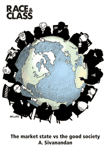
RACE & CLASS
Exploring the Intersections of Society and PowerRACE & CLASS, a prestigious journal published by SAGE Publications Ltd, focuses on advancing scholarship in the fields of Anthropology, Archaeology, Cultural Studies, and Sociology. Since its inception in 1959, it has become an indispensable resource for researchers and professionals interested in examining the intersections of race, class, and power dynamics within various sociocultural contexts. With an impressive standing in the academic community, it holds a Q1 status in multiple categories, placing it within the top quartile of journals for both Social Sciences and Humanities disciplines, thus ensuring high visibility and citation impact. Although it is not open access, the journal continues to provide rich, peer-reviewed content that invites informed discourse and critical analysis. With its dedication to addressing contemporary issues of inequality and social justice, RACE & CLASS remains a cornerstone for scholars and students alike, fostering a deeper understanding of complex societal structures.

PACIFIC NORTHWEST QUARTERLY
Illuminating Lesser-Known Histories of the Pacific NorthwestPACIFIC NORTHWEST QUARTERLY is an esteemed academic journal published by the University of Washington, dedicated to advancing scholarship in Cultural Studies and History as they pertain to the unique context of the Pacific Northwest region of the United States. With an ISSN of 0030-8803 and an E-ISSN of 2327-9753, the journal has maintained a consistent publication record since its inception, publishing critical research that often bridges gaps between historical narratives and contemporary cultural discourse. Although it has recently been categorized in the fourth quartile within its respective fields, the journal serves as a platform for underrepresented voices and lesser-known histories, thereby enriching the academic landscape. Researchers, professionals, and students alike will find valuable insights and scholarly debates that contribute to a deeper understanding of the Pacific Northwest's past and its ongoing cultural evolution. The journal offers traditional subscription-based access, fostering a community of meaningful engagement and inquiry among its readership.
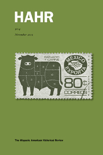
HAHR-Hispanic American Historical Review
Cultivating Knowledge in Latin American StudiesHAHR-Hispanic American Historical Review, published by DUKE UNIVERSITY PRESS, is a prestigious scholarly journal dedicated to the field of Latin American and Hispanic studies. With its ISSN 0018-2168 and E-ISSN 1527-1900, this journal boasts a remarkable reputation, as evidenced by its Q1 ranking in both Cultural Studies and History for 2023, placing it among the top tier of its category. The journal has consistently contributed to academic discourse since its inception in 1962, with a notable convergence of historical scholarship focused on the Hispanic American experience through 2024. HAHR is not open access, ensuring its publication standards resonate within a scholarly context that emphasizes rigorous peer review and academic integrity. Housed in the vibrant academic community of Durham, NC, this journal serves as an essential resource for researchers, professionals, and students alike, providing critical insights and fostering a deeper understanding of Hispanic heritage and history.

Historia-Santiago
Unlocking the Past: Open Access to Innovative HistoriesHistoria-Santiago is an esteemed academic journal published by the Pontificia Universidad Católica de Chile, Instituto de Historia. Since its inception in 2000, the journal has embraced an Open Access model, facilitating broad dissemination of historical research and ensuring that critical scholarly work is freely accessible to researchers, professionals, and students around the globe. With a focus on Latin American history, Historia-Santiago provides a platform for innovative research and contributions that engage with diverse historical narratives and methodologies. The journal aims to foster interdisciplinary dialogue and stimulate scholarly debate, thereby enriching the understanding of historical contexts and their implications in contemporary society. By maintaining high academic standards, Historia-Santiago occupies a vital role in the field of historical studies, encouraging authors to explore new ideas and perspectives that shape the understanding of our past.
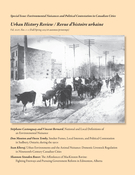
URBAN HISTORY REVIEW-REVUE D HISTOIRE URBAINE
Exploring the Tapestry of Urban EvolutionURBAN HISTORY REVIEW - REVUE D'HISTOIRE URBAINE, published by University of Toronto Press Inc., serves as a vital scholarly resource in the intersection of history and urban studies, focusing on the evolution of urban life and spaces. Established in 1978 and publishing continuously until 2012, and then resuming in 2014, this journal reflects on urban historical perspectives and contemporary urban issues, making significant contributions to both fields. With an impressive Q2 ranking in History and a Q4 ranking in Urban Studies as of 2023, the journal is positioned to attract a diverse readership of researchers, practitioners, and students alike. While currently not an open-access journal, it maintains a reputation for rigorous scholarship, encouraging the exploration of urban narratives that shape our understanding of cities today. For those invested in the past's lessons for future urban development, this journal is indispensable in navigating the complexities of urban history.

Journal de la Societe des Americanistes
Unveiling Cultural Dynamics Across the AmericasJournal de la Societe des Americanistes, published by UNIV PARIS X PARIS-NANTERRE, ARCHEOLOGIE & ETHNOLOGIE, is a distinguished platform for the dissemination of scholarly research in the fields of anthropology and cultural studies. With an ISSN of 0037-9174 and an E-ISSN of 1957-7842, this Open Access journal has been making academic content freely accessible since 2016, fostering a global dialogue among researchers and practitioners. Based in France, this journal prioritizes interdisciplinary discourse, enhancing the understanding of cultural dynamics and ethnic diversity across the Americas. Although currently ranked in the Q4 quartile for anthropology and cultural studies, its commitment to rigorous peer-reviewed research places it in a unique position to contribute to the academic landscape. Researchers, professionals, and students seeking to explore intricate cultural themes and anthropological perspectives will find the Journal de la Societe des Americanistes an invaluable resource for their scholarly endeavors.
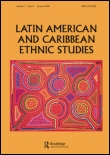
Latin American and Caribbean Ethnic Studies
Advancing Scholarly Dialogues in Ethnic StudiesLatin American and Caribbean Ethnic Studies, published by Taylor & Francis Ltd, stands as a pivotal platform for scholarly dialogue in the realms of anthropology, cultural studies, sociology, and political science. With an ISSN of 1744-2222 and E-ISSN of 1744-2230, this journal has established itself since its inception in 2006, covering a diverse array of topics up to the year 2024. Recognized for its academic rigor, it is categorized within the Q2 and Q1 quartiles based on the 2023 rankings, showcasing its significance within these fields; it ranks in the 79th percentile for cultural studies and 62nd percentile for anthropology according to Scopus. The journal is not only an essential resource for researchers and professionals, but it also serves as an educational tool for students interested in understanding the complex ethnic landscapes of Latin America and the Caribbean. Although it is not an open access journal, its high-impact research contributions make it invaluable for those committed to advancing knowledge in these critical areas of study. This publication fosters a deeper comprehension of the intersectionality of identity, culture, and politics in these regions, thus bridging theories and practices that resonate globally.
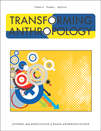
Transforming Anthropology
Elevating Anthropology through Pioneering ResearchTransforming Anthropology is a dynamic and influential journal in the field of Anthropology, published by Wiley. With an ISSN of 1051-0559 and an E-ISSN of 1548-7466, this journal has established a reputable position within academic circles, evidenced by its impressive Q2 rating in the 2023 category quartiles and a 77th percentile rank in the Scopus Ranks for Social Sciences. Since its inception, the journal has evolved to reflect contemporary anthropological discourse, addressing crucial issues from diverse perspectives. Although it does not currently operate under an Open Access model, its content remains accessible to a global readership eager to engage with pioneering research. Spanning converged years from 1990 to 1994 and 2010 to 2024, Transforming Anthropology serves as a vital platform for exploring transformative ideas and methodologies within the discipline. Researchers, professionals, and students alike can benefit from the scholarly contributions and insightful discussions fostered within its pages, making it an essential resource for anyone invested in the complexities of human culture and society.
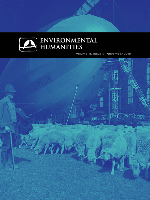
Environmental Humanities
Advancing Critical Perspectives on Environmental ChallengesEnvironmental Humanities, published by DUKE UNIVERSITY PRESS, is a premier journal that has established itself as a leading platform for interdisciplinary scholarship at the intersection of the environment and the humanities. With its open access framework since 2012, the journal fosters widespread dissemination of critical research that integrates perspectives from Anthropology, Ecology, and the Social Sciences. Currently holding impressive Q1 rankings in both Anthropology and Social Sciences for 2023, along with notable Q2 standings in Environmental Science fields, this journal provides a vital forum for innovative explorations of how human culture shapes and is shaped by environmental challenges. Situated in the United States, the journal encourages authors and thinkers to contribute to ongoing discussions about sustainability, ethics, and the cultural dimensions of environmental issues, making it an essential resource for researchers, professionals, and students alike. With a commitment to high-quality scholarship, Environmental Humanities plays a crucial role in advancing knowledge and understanding in a rapidly evolving field.

Eras
Exploring the Depths of Historical InquiryEras is an esteemed journal published by the Monash University, School of Historical Studies, that serves as a vital platform for scholars and students in the field of historical research. With an ISSN of 1445-5218, this journal focuses on a diverse range of historical topics, promoting rigorous scholarship and critical discourse. Although currently not categorized under Open Access, Eras remains committed to disseminating knowledge and fostering an understanding of historical dynamics. Based in Monash, Victoria, Australia, this journal aims to engage a global audience of historians, researchers, and professionals by facilitating the exchange of innovative ideas and research findings. Its commitment to maintaining a high standard of academic discourse underscores its significant role in shaping the future of historical studies.